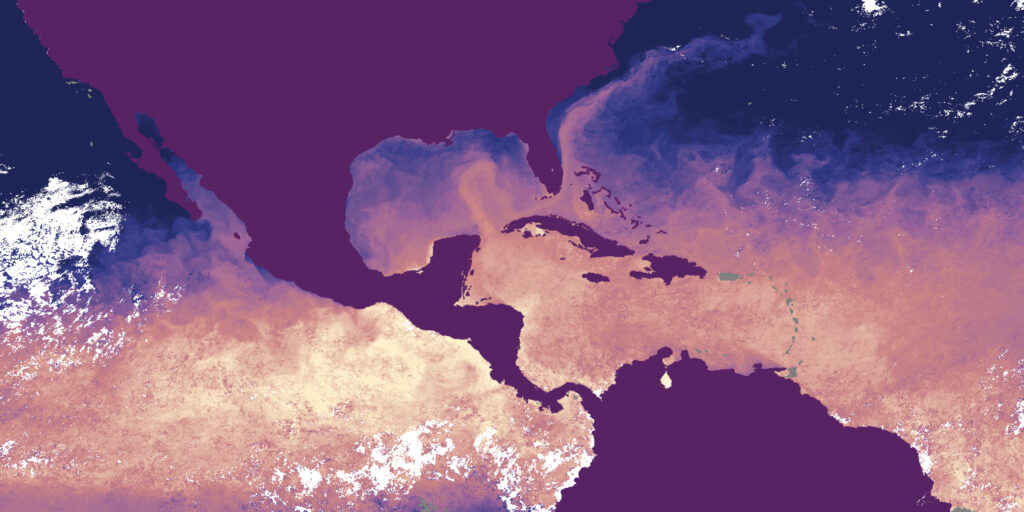
Ocean Current Affairs
By JAMES AUSTIN
OVER THE LAST EIGHT YEARS, with funding from the National Science Foundation, ConTex, the International Ocean Discovery Program, the Jackson School of Geosciences (JSG), and the Teresa Lozano Long Institute of Latin American Studies, an interdisciplinary group of scientists from the Institute for Geophysics/JSG and the National Autonomous University of Mexico (UNAM) has been studying the evolution of the Loop Current.* This current, a primary feeder of the Gulf Stream, forms a fundamental component of Earth’s climate system. Recently documented slowing of the Gulf Stream suggests that a warming planet may upset the global heat balance in the Northern Hemisphere, with far-reaching consequences for habitability and sustainability of affected communities. Effects range from cooling temperatures in northern Europe to rapidly rising sea levels along the Texas/Mexico Gulf Coast.
In 2022 and 2024, aboard the Mexican research vessel Justo Sierra, the team collected high-resolution seismic images of the seafloor and sub-seafloor in the Yucatán Channel east of the Campeche Peninsula. With this evidence, the team will assess the Loop Current’s long-term history in preparation for future coring and drilling of sedimentary samples to determine the current’s age. These measurements are being considered in the context of modern assessments of the Loop Current’s strength and complexity.
Two workshops have been held—one in Mexico City in 2023 and the second in Austin in 2024—to begin to integrate the paleoceanography of the Loop Current with its modern physical oceanography. The Galveston Bay Foundation in Texas, a community organization, also joined these discussions. They are leading efforts to enhance Gulf coastal resilience to strengthening storms and more rapid sea-level rise caused by changes in the Loop Current.
Our long-term goal is to continue the tradition of international collaboration in Loop Current studies. This current demands intensified, sustained scrutiny, considering the enormous stakes for this region as human-induced climate change continues.
James Austin, a marine geologist, is a longtime research professor at the Institute for Geophysics in the Jackson School of Geosciences at UT Austin.
Note
For more details on this study of the Gulf Loop Current, see Austin et al., “Ocean Current Affairs in the Gulf of Mexico,” Eos, May 19, 2025.
LLILAS Research Incubator
The Teresa Lozano Long Institute of Latin American Studies proudly funds an array of research. From Faculty Seed Grants that support cutting-edge, innovative projects to student research, LLILAS contributes to Latin American and Caribbean studies across the university, encouraging creativity through interdisciplinary and international collaboration. These projects have tangible impacts for academia and beyond.
A sampling of the Seed Grant projects currently being funded includes five in Geography and the Environment (one shared with Anthropology), one in Journalism and Media, one in Integrative Biology, and one in Spanish and Portuguese linguistics. In addition, over 100 students across multiple colleges are pursuing research with the help of grants and scholarships from LLILAS, or studying less-commonly-taught languages with LLILAS Benson Title VI funding.
AILLA News

During the 2024–2025 academic year, the Archive of the Indigenous Languages of Latin America (AILLA) launched a completely rebuilt repository with trilingual graphical user interfaces (in English, Spanish, and Portuguese) and has successfully migrated its collections.
Learn more at AILLA.
